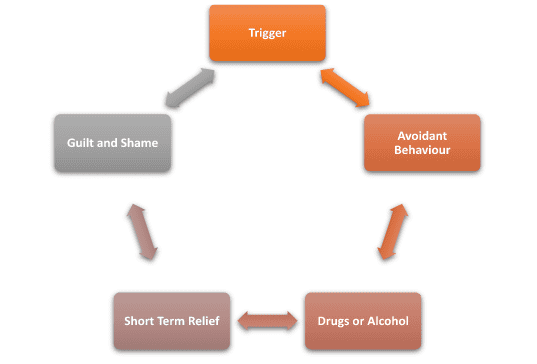- 98143 70700
- info@thehermitage.rehab
- 22, Circular road, Opp. VR Ambarsar, Amritsar
Feeling ashamed of something that happened to you or about something you did is quite natural. As humans, guilt and shame are basic emotions and we are wired in a way that they help us to overcome some uncomfortable situation and outgrow it eventually. But why addiction and shame are so intertwined? What relationship do they share that remedying it is so important?
Even though guilt and shame are used interchangeably, they are rather different in their meaning. While guilt is often induced because of some action taken including negative outcomes, shame on the other hand, is the declaration of how you are not a good person because of it and incapacitates you to make a move for the desired change.
Addiction as we know is one of the deadliest diseases masquerading itself behind the patient’s sense of self-worth and self-control. Frequently, a patient of addiction indulges in behaviors that he would be afraid to face later on and ends up creating a bubble of captivity for himself that becomes suffocating as time passes by.
Shame, as we know, becomes toxic and the patient is entrapped in its claws where it is causing addiction to flare and in return become more prominent with the progression of the disease.

Eventually, shame turned toxic can become overpowering and overwhelming. It can make you feel;
The impact of shame on the mind of the patient is excruciating and when addiction comes into the picture, the situation becomes even more dangerous as guilt and shame are two major barriers in recovery. Even though the patient might admit that he is a diseased man and needs help, shame makes it extremely difficult for him to reach out and seek help as he is unable to accept what his addiction has made him do.
Dr. JPS Bhatia, a leading figure in the field of addiction psychiatry for the past three decades, believes that the treatment of addiction should revolve around unconditional regard for the patients with never-ending empathy for their pain.
Under his guidance, the treating team at the Hermitage Rehabilitation Centre, consisting of mental health professionals, has curated a program to help patients heal from their shame in a safe space that is completely non-judgemental and open in nature. With the aid of various psychotherapies such as Cognitive Behavioural Therapy, Mindfulness-based therapies, and Insight oriented approaches are used to yield better results.
WhatsApp us